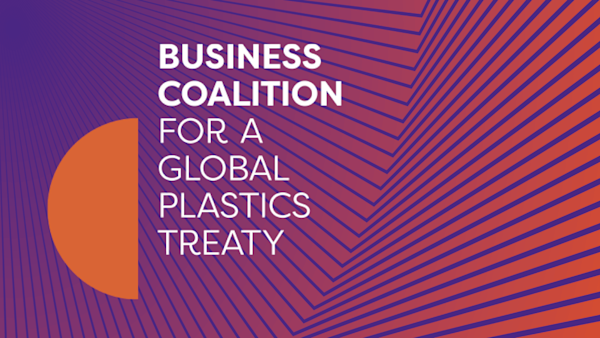With only two years to negotiate an ambitious treaty, we cannot afford delays.
A UN treaty based on legally-binding global rules and comprehensive circular economycircular economyA systems solution framework that tackles global challenges like climate change, biodiversity loss, waste, and pollution. It is based on three principles, driven by design: eliminate waste and pollution, circulate products and materials (at their highest value), and regenerate nature. measures presents a unique opportunity to accelerate systems change and end plastic pollution.
To maintainmaintainKeep a product in its existing state of quality, functionally and/or cosmetically, to guard against failure or decline. It is a practice that retains the highest value of a product by extending its use period. momentum and ensure we achieve an ambitious treaty within the next two years, the upcoming negotiating session at the end of May should result in the creation of a zero-draft text.
The Ellen MacArthur Foundation is calling for a treaty that is based on:
Legally binding global rules. These are crucial to stimulate the investment and innovation essential to driving global change.
Comprehensive circular economy measures, with a focus on upstream action. To achieve meaningful progress, we must reduce our use of plastics, increase reusereuseThe repeated use of a product or component for its intended purpose without significant modification. models and fundamentally redesign our approach to plastic packaging across its whole lifecycle.
What can we expect from the INC-2 negotiations?
The second round of negotiations will begin in Paris, France on the 29th of May and last until the 2nd of June.
Also known as INC-2 (or International Negotiation Committee), this session marks a crucial stage in the negotiations as it will set the agenda for what will likely be included in the draft of the treaty.
With only two years left to make the treaty a reality, we cannot afford to delay the creation of this zero-draft text.
What should a treaty focus on?
Ahead of the upcoming negotiations, the Ellen MacArthur Foundation has contributed two submissions to the INC Secretariat as well as a paper on reuse, all of which you can find on our website.
We are calling for these elements to be included in the treaty:
A substantial reduction in plastic production and use, through a circular economy approach.
To reduce leakage into the environment, plastic items that cannot be eliminated should have clear requirements on their design and the systems for keeping them in circulation in practice and at scale.
Mandatory Extended Producer Responsibility policies to ensure all industry players fund the collection and treatment of plastic packaging.
A focus on upstream action. We need reuse to reduce plastic pollution - it offers one of the biggest opportunities to cut plastic leakage, as well as lower emissions and pressure on natural resources.
To lead to swift and meaningful action, a treaty should initially focus on the types of plastic most likely to end up in the environment - including packaging, which creates around 40% of total plastic waste.
Why we are focusing on reuse
The treaty has a vital role to play in scaling reuse by including measures which will enable harmonised product design and infrastructure.
Reuse offers one of the biggest opportunities to cut plastic leakage, as well as lower emissions and pressure on natural resources.
It is estimated that scaling reuse models can cut annual plastic leakage into the ocean by 20% by 2040.
Reuse schemes can cut life cycle emissions of a product by up to 80% compared to single-use products and reduce pressure on natural resources such as water.
The reuse market is a multi-billion-dollar economic opportunity providing jobs across the entire value chain.
Individual countries and businesses alone cannot realise the shift to reuse at a global scale without uniform legislation applied consistently across global markets. Read our reuse paper to find out more.
To find out more about how the Foundation is engaging with the upcoming negotiations for a UN treaty to end plastic pollution, visit our dedicated page here.
Shared ambition
To help drive change, the Foundation, along with WWF, has convened the Business Coalition for a Global Plastics Treaty - more than 100 organisations across the plastics value chain, financial institutions, and NGO partners, are collectively asking for an ambitious UN treaty.
The Coalition's shared vision, endorsed by all members, sees the treaty as the key policy mechanism to accelerate progress in three critical areas:
the reduction of plastic production and use through a circular economy approach,
increased circulation of all necessary plastics,
and the prevention and remediation of hard-to-abate micro- and macro-plastic leakage into the environment.
To find out more about the Business Coalition and how it plans to achieve its vision for a circular economy for plastics, visit the website.







